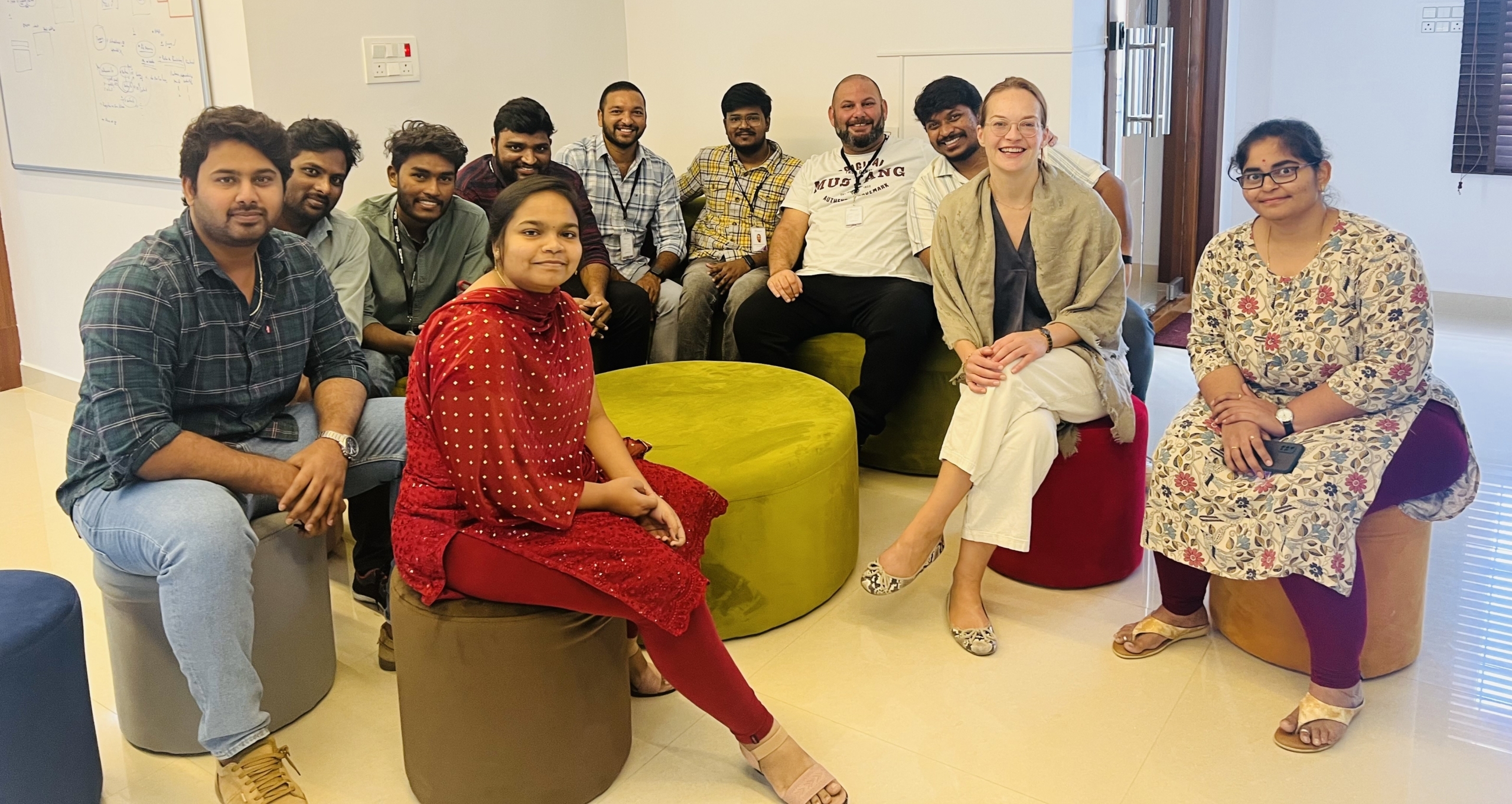IT projects with team members from India and Germany: communication hurdles and how to avoid them
Communication between German or European companies and their offshore outsourcing partners can be a challenge due to cultural differences.
We want to explore this topic in more depth in this blog post.
We will focus on the specifics of communication between team members from Germany or Europe and India, based on our own experiences.
However, the basic principles can also be applied to other outsourcing destinations.
Prejudices and their causes
Outsourcing is a common business model in today’s globalized world, especially in the IT sector.
Clients undoubtedly benefit from cost savings, access to a global pool of skilled labor and the flexibility that outsourcing can offer.
On the other hand, there are challenges such as time differences, language barriers and different working styles.
It is not without reason that there are often prejudices that lead to reluctance on the part of potential outsourcing customers.
From over fifteen years of outsourcing experience, we know that these prejudices are not groundless, but have their roots in difficult or failed projects and negative experiences in the past.
In numerous cases, there were reports of deadlines not being met, inadequately implemented requirements and constant changes of processor.
Even in our projects, our experiences were not exclusively positive.
However, cases reported by customers and business partners as well as our own projects have shown that it was primarily communication hurdles that made collaboration difficult.
Recognizing these and preventing them in advance is therefore a relevant aspect for the success of an outsourcing project.
Using cultural differences as an opportunity
As a first step, everyone involved should be aware that cultural differences exist.
This sounds banal, but it is a frequent source of error (“I treat all team members the same, what else can I do?”).
If you ignore these differences and are unable or unwilling to adapt your communication, you run the risk of the project’s success suffering as a result.
It is important to understand that cultural differences do not simply disappear by treating all team members equally.
Nevertheless, this should not lead to resignation, but should be seen as a challenge.
In most cases, communication hurdles can be overcome and can even lead to easier and more efficient collaboration.
The initial investment of time and effort in identifying and overcoming communication challenges can have a positive effect later on.
In our experience, working intensively with cultural differences and consciously developing communication rules in the outsourcing team can ultimately lead to easier and more efficient communication than with team members from the same cultural environment on site.
This is due to the fact that the importance of communication as a success factor may have been dealt with only superficially or not at all in relation to the latter.
In addition, different perspectives and approaches in a global team can lead to innovative solutions that might not have been found in a non-diverse team.
It is therefore important to accept the challenge and appreciate cultural differences and the resulting learnings.
Recognizing and respecting differences
When communicating, it is typically human to initially draw conclusions about others from ourselves.
After all, our own wealth of experience, our own cultural imprints and memories are the largest pool of information about human behavior available to us.
And when we encounter culturally similar people, this approach is usually successful.
However, this approach quickly reaches its limits when it comes to communicating with people from other cultures.
There are even differences within Germany, such as between northern Germans and Bavarians.
On the Indian side, the differences are even more diverse, as it is not a single country, but a continent with around 1.4 billion people and around 22 official, but 180 known languages with over 500 dialects.
It is therefore hardly surprising that German or European companies and their Indian outsourcing partners have different working cultures and approaches.
In the following, we would like to point out some challenges and possible solutions, without claiming to have a patent remedy, as every person is individual.
Language barriers and bridges
Working in multinational teams often requires the use of English as a common communication platform.
It is important to be aware that English is not the native language of every team member and that not everyone finds it equally easy to express themselves flawlessly in this language.
Sensitivity is needed to ensure that everyone feels understood and can express themselves freely.
Clear communication guidelines, regular training and the promotion of open dialog can help to overcome language barriers.
Hierarchies
Hierarchical structures are often more pronounced in Germany than in India, where teamwork and flat hierarchies are preferred.
However, this cannot be said across the board, as US companies in particular, which open entire offices in India, sometimes establish even more hierarchical structures.
It is therefore not only the origin of the employees that is decisive, but also their previous professional stations.
When integrating team members from India, it is therefore advisable to avoid establishing endless hierarchical, directive and reporting structures.
It is more promising to promote cooperation within the team and the motivation of the team members, whereby hierarchical structures should be limited to what is necessary.
Relationship and factual level
Employees from India like to maintain a relationship-oriented approach, even in a professional context.
In contrast, many employees in Germany are very fact-oriented and want to leave personal aspects out of their professional lives.
To name a few striking examples: In India, it is much more common than in Germany for several members of a family to run a (small) business together or for relatives to deliberately work for the same employer.
Celebrating the various festivities and (religious) customs together in the office or with work colleagues is also nothing special in India, but rather rare in Germany (apart from the obligatory Christmas party).
It is advisable for employees from Germany not to be too reserved towards team members with an Indian background, if possible, and to show genuine interest in the living conditions of the other group.
An inquiry about the family’s well-being is generally received positively in India and answered authentically.
Consciously shaping a feedback culture
The feedback culture with regard to work tasks should be consciously designed against the background of the differences in the relationship and factual levels.
There will be situations in which something has not worked as planned or a team member has made a mistake.
It is known that employees in India may prefer to keep critical feedback to themselves so as not to jeopardize the personal relationship.
The German or European team members can play a role here by striving for and exemplifying an open feedback culture.
If it becomes necessary for a team member with a German cultural background to give critical feedback to a team member from India, a cautious approach should be taken.
It is not a question of completely adapting culturally, i.e. under no circumstances should the “whether” of feedback be questioned, but rather the “how”.
In our view, it is important to give feedback in a targeted, factual manner and to make it clear that the person is still valued and respected.
It is unfavorable, for example, to raise your voice or generally question a person’s abilities.
Self-determined way of working: Curse or blessing?
The work culture in Germany and Europe, especially since the spread of the “New Work” concept, is sometimes very different from the habits of employees in India.
It is important to bear in mind that the degree of initiative depends heavily on individual character traits.
In India, our employees often reported that independent working was not necessarily encouraged in previous jobs.
Employees with this professional history often expect clear task assignments and may feel lost if no further tasks follow.
This can be remedied by trusting employees to work on larger tasks independently and to divide them up sensibly.
Feedback and support are particularly important at the beginning, when employees are gradually introduced to a more self-determined way of working.
At the end
Respectful cooperation based on trust and understanding can form the basis for the success of a multinational team.
It is important to respect existing cultural differences and see them as an opportunity to learn from each other.
It is important to actively address and clarify these prejudices so that they do not hinder cooperation on both sides.
Avoiding stereotypes and emphasizing the individual skills of each team member helps to create a positive team dynamic.
We hope that this blog post helps to clarify cultural differences in the collaboration of multinational teams.
This is not an exhaustive account and we reserve the right to expand the article from time to time based on further relevant experiences that we will make on our exciting journey with BiKollegen and Omnics Technologies.
All interested readers are also invited to send us their own experiences and learnings on IT outsourcing so that we can include them in our discussion of the topic.



